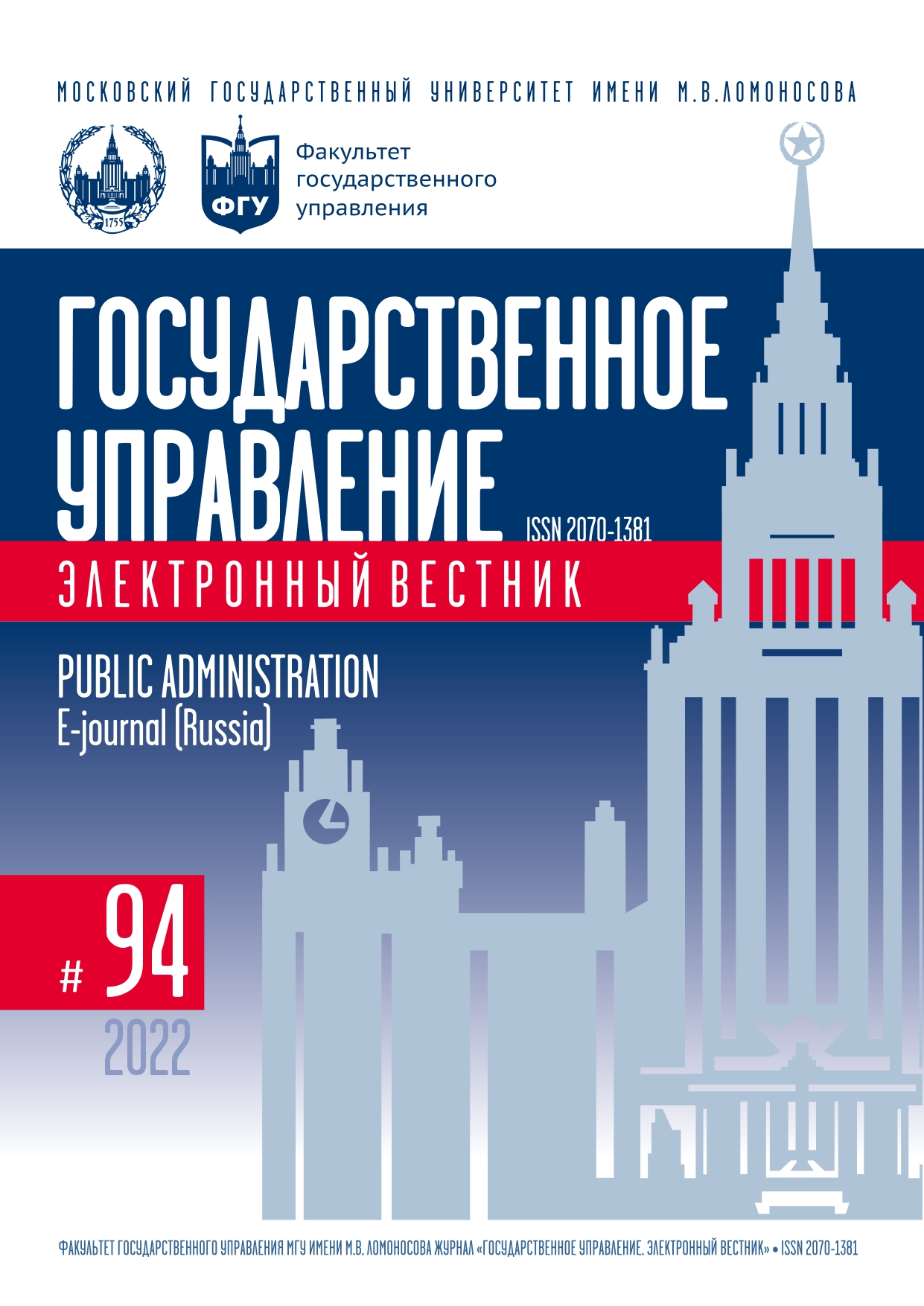Artificial Intelligence in Corporate Governance: Perspectives and Boundaries of Use
Keywords:
Corporate governance, artificial intelligence, managerial decision-making process, board of directors, competitive advantageAbstract
The aim of this article is to identify the expected improvements in corporate governance using artificial intelligence (AI) technologies and to estimate perspectives of their application for strategic management. Currently, two paradigms have been formed that explore the prospects of using artificial intelligence in organizational research: a paradigm that considers artificial intelligence as a set of meta-algorithms capable of finding algorithms for solving specific corporate governance problems and a paradigm that considers artificial intelligence as a means of optimizing people’s behavior in an organization. As an area of application of artificial intelligence in corporate governance, the process of making managerial decisions at the level of the board of directors is singled out. As a result, the possibilities of artificial intelligence to improve the efficiency of managerial decision-making were identified. Among them are: providing the necessary volume and variety of information with less resource costs, rapid analysis of large data sets, development of reliable scenarios for the consequences of decisions made, impartiality of decisions, and others. AI technologies are useful tools for increasing decision-making efficiency which is demonstrated using Russian companies’ examples. The article analyzes as well problems that prevent AI technologies from a wide use: limits of legislation, which controls their use, intellectual property protection in this sphere, data privacy; uncertainty of responsibility for risk decision-making based on AI and its consequences. Thus, AI usage in corporate management is limited by a set of ethical issues related to consequences of decisions, low level of legislation and specific risks which require further researches.
References
Блинникова А.В., Йинг Д.К. Использование искусственного интеллекта в процессах управления человеческими ресурсами // Вестник ГУУ. 2020. № 7. С. 14–21. DOI: 10.26425/1816-4277-2020-7-14-21
Бруссард М. Искусственный интеллект. Пределы возможного. М.: Альпина нон-фикшн, 2021.
Воробьева И.В., Салахутдинов В.Д. Проблемы правового регулирования искусственного интеллекта // Наука и образование: будущее и цели устойчивого развития. Материалы XVI международной научной конференции, в 4 частях. М.: изд. ЧОУВО «МУ им. С.Ю. Витте». 2020. Ч. 4. C. 65–75.
Гусев А.В., Добриднюк С.Л. Искусственный интеллект в медицине и здравоохранении // Информационное общество. 2017. № 4-5. С. 78–93.
Джураев Д.Ш. Искусственный интеллект в менеджменте // Интернаука. 2021. № 25–1. С. 80–82.
Петрунин Ю.Ю. Искусственный интеллект: ключ к будущему? // Философские науки. 2018. № 4. С. 96–113. DOI: 10.30727/0235-1188-2018-4-96-113
Постолит А.В. Основы искусственного интеллекта в примерах на Python. СПб.: БХВ-Петербург, 2021.
Прашкевич Г., Соловьев С. Стивен Джобс. М.: Молодая гвардия, 2019.
Стародубов О.О., Макаров В.В., Блатова Т.А., Годун А.Д. Инновационные решения ПАО «МТС» по внедрению современных услуг и технологий искусственного интеллекта // Экономика и бизнес: теория и практика. 2020. № 9–2. P. 73–77. DOI: 10.24411/2411-0450-2020-10732
Таулли Т. Основы искусственного интеллекта: нетехническое введение. СПб.: БХВ-Петербург, 2021.
Устинова О.Е. Искусственный интеллект в менеджменте компаний // Креативная экономика. 2020. Т. 14. № 5. С. 885–904. DOI: 10.18334/ce.14.5.102145
Форд Г. Моя жизнь. Мои достижения. М.: Астрель, 2017.
Чуланова О.Л., Фомина Е.В. Применение игровых технологий и искусственного интеллекта в обучении производственного персонала на предприятиях энергокомплекса // Вестник Евразийской науки. 2019. № 1. URL: https://esj.today/PDF/54ECVN119.pdf
Якокка Л. Карьера менеджера. М.: Попурри, 2022.
Enholm I., Papagiannidis E., Mikalef P., Krogstie J. Artificial Intelligence and Business Value: A Literature Review // Information Systems Frontiers. 2021. DOI: 10.1007/s10796-021-10186-w
Fiori S. Forms of Bounded Rationality: The Reception and Redefinition of Herbert A. Simon’s Perspective // Review of Political Economy. 2011. Vol. 23. Is. 4. Р. 587–612. DOI: 10.1080/09538259.2011.611624
Goralski M.A., Tan T.K. Artificial Intelligence and Sustainable Development // The International Journal of Management Education. 2020. Vol. 18. Is. 1. DOI: 10.1016/j.ijme.2019.100330
Hilb M. Toward Artificial Governance? The Role of Artificial Intelligence in Shaping the Future of Corporate Governance // Journal of Management and Governance. 2020. Vol. 24. P. 851–870. DOI: 10.1007/s10997-020-09519-9
Jarrahi M.H. Artificial Intelligence and the Future of Work: Human-AI Symbiosis in Organizational Decision-Making // Business Horizons. 2018. Vol. 61. Is. 4. Р. 577–586. DOI: 10.1016/j.bushor.2018.03.007
Kolbjørnsrud V., Amico R., Thomas R. How Artificial Intelligence Will Redefine Management // Harvard Business Review. 2016. URL: https://hbr.org/2016/11/how-artificial-intelligence-will-redefine-management
March G., Simon H. Organizations. New York: Blackwell, 1998.
Monks R., Minow N. Watching the Watchers. What Is Corporation? New York: Thousand Oaks, 1996.
Provost F., Fawcett T. Data Science for Business: What You Need to Know about Data Mining and Data-Analytic Thinking. Sebastopol: O’Reilly Media, 2021.
Russel S., Norvig P. Artificial Intelligence: A Modern Approach (Pearson Series in Artificial Intelligence). New York: Pearson, 2021.
Smith R. Idealizations of Uncertainty, and Lessons from Artificial Intelligence // Economics. 2016. Vol. 10. Is. 1. DOI: 10.5018/economics-ejournal.ja.2016-7
Soni N., Sharma E., Singh N., Kapoor A. Impact of Artificial Intelligence in Business: From Research and Innovation to Market Deployment // Procedia Computer Science. 2020. Vol. 167. P. 2200–2210. DOI: 10.1016/j.procs.2020.03.272
Trunk A., Birkel H., Hartmann E. On the Current State of Combining Human and Artificial Intelligence for Strategic Organizational Decision Making // Business Research. 2020. Vol. 13. Р. 875–919. DOI: 10.1007/s40685-020-00133-x

